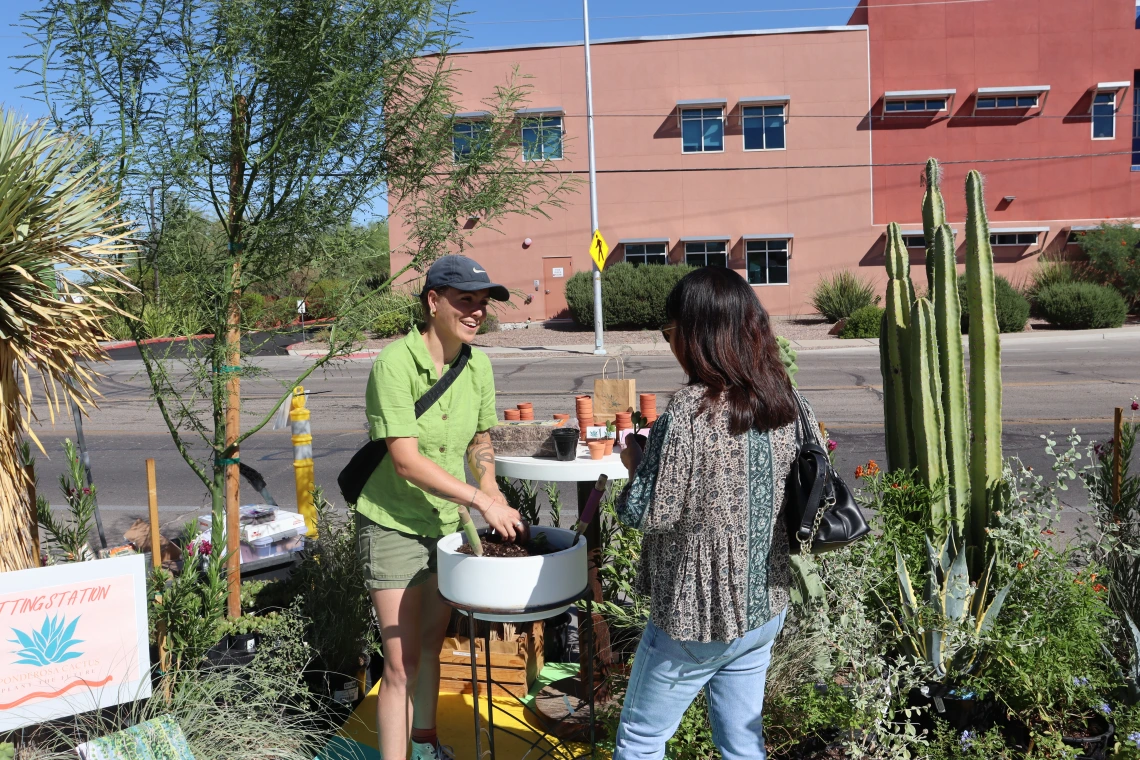Engaging Communities: CAPLA Students Showcase Native Plants on Park(ing) Day

Ashley Danforth, a master of landscape architecture student and co-president of the ASLA student chapter, speaks with community member during Park(ing) Day 2024.
CAPLA’s student chapter of the American Society of Landscape Architects (ASLA) transformed a parking space into a vibrant, sustainable green space for Tucson’s Park(ing) Day, highlighting the beauty of native Southwest plants.
Park(ing) Day is a global event where people temporarily repurpose curbside parking spaces, converting them into social spaces to advocate for safer, greener, and more equitable streets. In 2024, there were 146 confirmed Park(ing) Day sites, including locations in Hungary, Portugal, Bulgaria, Australia, Thailand, Taiwan, and Germany.
ASLA has participated in Park(ing) Day for years, and the event is closely tied to CAPLA’s history.
“As we were preparing for the event, one of the teachers at CAPLA reminisced with me about his own years as a student setting up for Park(ing) Day,” said Ashley Danforth, co-president of the ASLA student chapter.
Danforth explained that while the global theme centered on parking reform, the regional theme focused on native plants.
“We wanted to spread knowledge about native plants to emphasize not only the beauty of the desert, but also the benefits these plants offer in terms of saving water, increasing habitat, and boosting biodiversity,” Danforth said.
Esmeralda Carrasco, chief operating officer at Ponderosa Cactus and co-president of the ASLA student chapter, incorporated resources from her nursery into Park(ing) Day.
“At Ponderosa Cactus, we are always focused on showcasing the value of native plants and sustainable practices, so bringing those principles to this event felt natural,” Carrasco said.
Ponderosa Cactus donated terracotta pots with jade plants, which symbolize growth, prosperity, and renewal.
“People loved the hands-on planting station, and the symbolism of the jade plants really resonated with them,” Carrasco said.
She shared that combining her passion for the ASLA student chapter and Ponderosa Cactus allowed her to connect with the community on a deeper level and share her enthusiasm for green spaces.
The students painted the base of their parking space to complement their flora-filled display, which included shrubs, agaves, cacti, yuccas, and trees commonly found in the Southwest.
“The painting design was meant to echo natural shapes resembling topography and river flows with inspiration drawn from Roberto Burle Marx,” Danforth said.
Danforth described the community’s reaction as enthusiastic.
“We had people taking a seat in the shade, asking about different plants and how best to use them, wondering about native species they can utilize to lower their water demand and getting their hands dirty to pot and take home a succulent,” she said.
Attendees of the event spoke with ASLA student chapter members about sustainable design and how small touches can transform a space.
“I had a lot of great conversations with various community members,” said Annamaria Pongratz, a student chapter member ASLA who volunteered at Park(ing) Day.
As the event continued throughout the day, the impact of their efforts became clear.
“It was really heartwarming to see the public’s response after so many students put their time and consideration into trying to make something they thought people would enjoy,” Danforth said.
“It was fulfilling to see how our involvement brought this space to life and created such a meaningful experience for visitors,” Carrasco added.
Carrasco, Danforth, and Pongratz each reflected on the lessons they took from their 2024 Park(ing) Day experience.
For Carrasco, the event underscored the significance of connecting with the community.
“I learned the value of community engagement,” she said. “Our conversations sparked new ideas and encouraged people to think differently about how they can incorporate plants into their everyday spaces.”
Danforth emphasized the power of collaboration.
“We can really do a lot when we come together as a team, and that people are eager to get involved and incorporate greener and more sustainable practices into their everyday lives,” she said.
Pongratz echoed both sentiments, adding that the event highlighted the collective impact of Tucson’s community efforts to "educate others about sustainability and community involvement."



